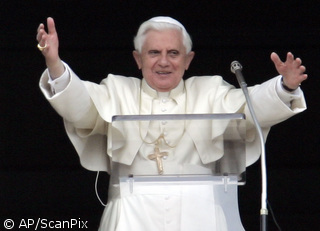European Union supporters in Latvia and Estonia expressed concern Thursday about a new survey pegging their countries as the most EU-skeptical in Europe
Published:
4 August 2003 y., Monday
European Union supporters in Latvia and Estonia expressed concern Thursday about a new survey pegging their countries as the most EU-skeptical in Europe—findings that come just two months before both Baltic states hold referendums on membership. A mere 32 percent of Estonians and 37 percent of Latvians agreed entry would be "a good thing," making them the most pessimistic of those questioned in the EU study released Wednesday. By contrast, 72 percent of Cypriots and 61 percent of Poles said joining would be good for them.
Latvia and Estonia will be the last of 10 EU candidate countries to put the issue of entry to a vote—and observers say there's now a chance that one or both nations could become the first to reject membership in Europe's most powerful multilateral club.
"People are afraid, they don't know what to believe and they're confused," said Pille-Mai Helemae, spokeswoman for the high-profile "Yes to the EU" group in Estonia. "It's going to be a hard fight. But in the end, I'm sure enough people will see more pros than cons to membership." Confusion about the EU was illustrated in the biannual Eurobarometer _ which questioned 1,000 people in each candidate nation in May—with 62 percent of Latvian and 71 percent of Estonian respondents saying they were either poorly informed about the accession process or not informed at all.
The Czech Republic, Hungary, Lithuania, Poland, Slovakia, Slovenia and Malta have already approved EU referendums, most by wide margins. Cyprus is leaving it's decision to lawmakers. If Estonia and Latvia pass their plebiscites on Sept. 14 and Sept. 20 respectively, they would join the EU together with the other candidates in 2004.
Virtually all top leaders in Estonia and Latvia have been pro-EU since the Baltic Sea nations regained independence—arguing that entry will raise their nations international stature, forge vital European trade links and boost living standards.
But official enthusiasm has never been matched outside the halls of power, with many Estonians and Latvians fearing a loss of sovereignty to the EU. Anti-EU groups compare what they say is an overly centralized EU with the U.S.S.R.; one of their symbols is an EU flag stamped with a Communist hammer and sickle.
If the results of the latest survey spooked EU supporters, they delighted opponents. "If you're a EU supporter, I believe the picture is even blacker," said Uno Silberg, who heads Estonia's "No to the EU Movement." "We're confident the referendum will fail."
Šaltinis:
balticsww.com
Copying, publishing, announcing any information from the News.lt portal without written permission of News.lt editorial office is prohibited.
The most popular articles
 Divorcing someone of another nationality can be legal and emotional nightmare.
more »
Divorcing someone of another nationality can be legal and emotional nightmare.
more »
 People from various countries hold quite a favourable opinion about Lithuania’s governance, its activities in the international community, and economic living and working conditions in Lithuania.
more »
People from various countries hold quite a favourable opinion about Lithuania’s governance, its activities in the international community, and economic living and working conditions in Lithuania.
more »
 An African eco-village in South Africa's wine region receives funding from a surprising source.
more »
An African eco-village in South Africa's wine region receives funding from a surprising source.
more »
 Teaching children about basic finance so they avoid getting into bad debts at a later age is the aim of a leading MEP.
more »
Teaching children about basic finance so they avoid getting into bad debts at a later age is the aim of a leading MEP.
more »
 The proposed European Blue Card scheme for skilled immigrants will pass a crucial vote in the Civil Liberties Committee on Monday.
more »
The proposed European Blue Card scheme for skilled immigrants will pass a crucial vote in the Civil Liberties Committee on Monday.
more »
 Talk of the Town brings you the latest in news, music and celebrity talk.
more »
Talk of the Town brings you the latest in news, music and celebrity talk.
more »
 Genealogists from Ancestry.com discovered that Palin and the late princess descended from John Strong and his wife Abigail Ford.
more »
Genealogists from Ancestry.com discovered that Palin and the late princess descended from John Strong and his wife Abigail Ford.
more »
 Tunisian journalist Souhayr Belhassen has campaigned in defence of human rights for more than three decades.
more »
Tunisian journalist Souhayr Belhassen has campaigned in defence of human rights for more than three decades.
more »
 For years parents in the EU have struggled to find good, affordable childcare facilities. In 2002, EU leaders declared childcare a high priority and, to show they meant business, set specific targets.
more »
For years parents in the EU have struggled to find good, affordable childcare facilities. In 2002, EU leaders declared childcare a high priority and, to show they meant business, set specific targets.
more »
 Pope Benedict XVI opens a major Vatican meeting and urges man not to brush God aside by declaring himself master of the world.
more »
Pope Benedict XVI opens a major Vatican meeting and urges man not to brush God aside by declaring himself master of the world.
more »